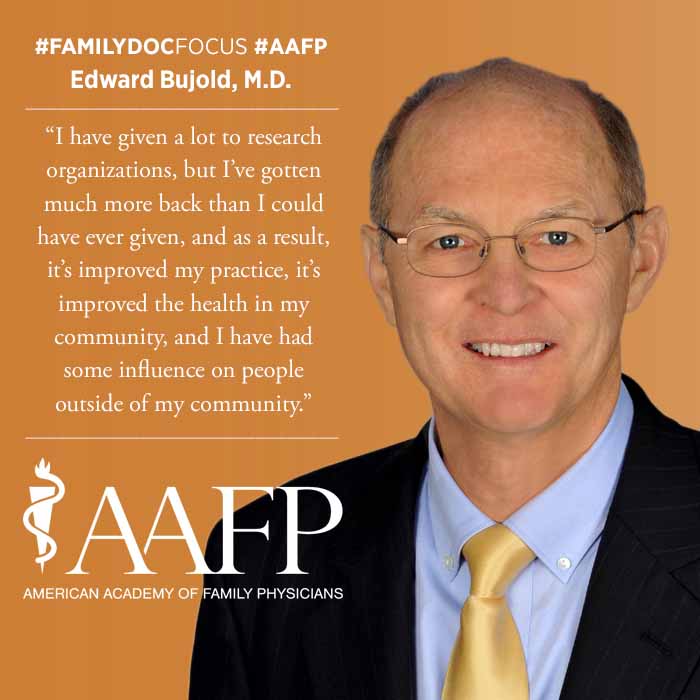FP Aims to Stay on the Cutting Edge of Family Medicine
May 13, 2019 09:15 am Jill Sederstrom – Edward Bujold, M.D., isn't someone who's content with the status quo. Throughout his more than three decades of family medicine practice, Bujold has always looked for ways to be better -- whether that's through tracking research to stay abreast of cutting-edge practice ideas, leading a community's fight against the opioid crisis or implementing patient-centered strategies to reduce unnecessary hospital admissions.
And all of it, said Bujold, is driven by his passion for family medicine and his desire to establish and maintain strong relationships with the patients he's served for the past 32 years at his private practice in Granite Falls, N.C.
"Medicine is so complex, and it's very difficult for a patient -- without a 'captain of the ship,' per se -- to navigate through medicine and make the decisions," he said.
For the past 25 years, Bujold has been an active member of the AAFP National Research Network, attending annual meetings and working with other members to integrate innovative ideas into his practice.
"The ideas we talked about at those meetings were at the cutting edge of family medicine, so I learned a lot and I probably was able to institute some things in my practice that were 10 or 15 years ahead of the curve," he said.
Bujold, who is also a member of the North American Primary Care Research Group, credits these organizations with enabling him to constantly rethink how care is delivered and find new ways to improve patient outcomes and identify practice efficiencies.
"I have given a lot to research organizations, but I've gotten much more back than I could have ever given, and as a result, it's improved my practice, it's improved the health in my community, and I have had some influence on people outside of my community," Bujold said.

In 2010, he transformed his practice into a patient-centered medical home -- complete with National Committee for Quality Assurance certification -- to demonstrate the practice's value to payers and show how a team approach to care could significantly alter patient outcomes. As part of this process, he determined that an embedded mental health professional can be a critical part of the care team to ensure that each patient's complete health needs are addressed.
"I am more like a CEO now," Bujold explained, "and everybody works to the highest level of their medical degree or nursing degree or medical office assistant degree."
The practice's PCMH transition coincided with Bujold's service as chair of a local hospital committee tasked with examining readmission rates; the committee determined that patients who go to the ER have a 75% likelihood of being admitted to the hospital.
Armed with that knowledge, Bujold and his staff made the decision to always make time to see patients in their office -- regardless of how busy they were -- and to implement chronic disease management practices. As a result, they were able to reduce hospital admissions among their patients by 80%.
Bujold is also working to help other physicians through his role as chief physician strategist for KPN Health, a medical consulting company that strives to improve physicians' experiences with IT by offering more effective solutions.
For all these reasons, Bujold has become an icon in his community -- even leading a county task force charged with creating clinical guidelines for treating patients with chronic pain in an effort to reduce prescribing rates of narcotics.
Still, after three decades in family medicine and a wide range of projects and special interests he's pursued, Bujold's focus remains on the patients he serves.
"It's all about relationships, and if you don't have a relationship with somebody, it just isn't medicine to me," he said.